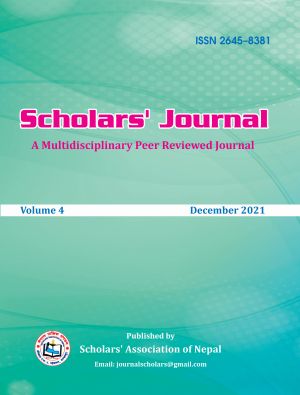Barghar System in Transition: Experiences from Dangaura Tharus of Western Nepal
DOI:
https://doi.org/10.3126/scholars.v4i1.42476Keywords:
Customary-laws, Bhaalmansa, Dangaura Tharus, ethno-hybridisation, western NepalAbstract
The Tharus have their own sort of traditional governance system for dealing with their conflicts in each village throughout the western Tarai part in twenty two districts of Nepal. This paper attempted to answer how the perspectives and experiences of Tharu people provide an insight into the perception of indigeneity and modernity in the context of Tharu Barghar/Bhaalamansa (Village Chief) system in western Nepal, and what type of confrontation between indigeneity and modernity in Barghar system of the Tharus are practised. I employed interpretivism as a research paradigm and critical ethnography as a research design which includes focus group discussion and interview with Barghars and social elites of Kailali district of Far western Province, Nepal. Human Needs theory, Marxist theory, Subaltern theory, Modern theory and Hybridity theories were reviewed and examined in this study to analyse the Barghar System. The political influence in the customary and traditional Barghar system has caused an imposition that has modified the system in the essence and greed of political leaders. The ethno-hybridisation seen in the existing Barghar system at present is the byproduct of globalisation and political sensibility which has indirectly given the sense of pillage of the system. The findings support policy making in the local as well as federal government level and the policy on local curriculum designers at school level. The Barghars and the social elites were empowered regarding the cultural identity in the continuation of the system in future.
Downloads
Downloads
Published
How to Cite
Issue
Section
License
Copyright (c) 2021 Nathuram Chaudhary

This work is licensed under a Creative Commons Attribution-NonCommercial 4.0 International License.
Copyright © The Authors

